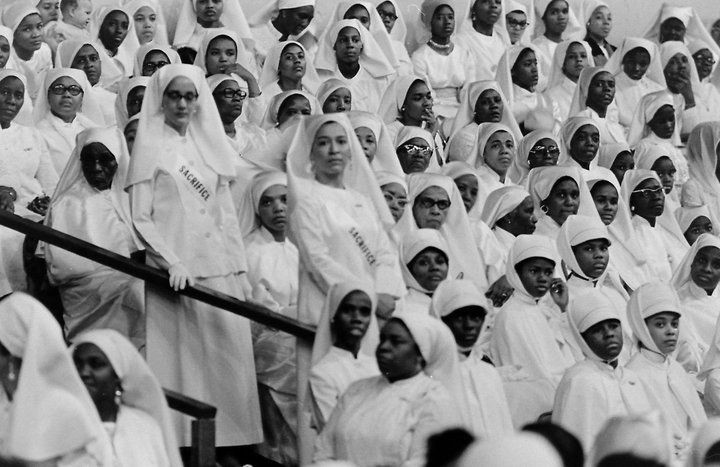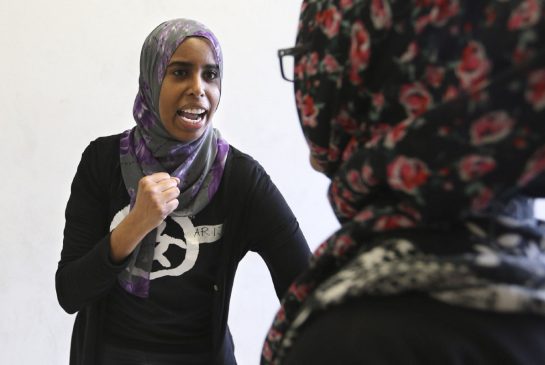When I am in Washington, DC my favorite thing to do is sit with my grandparents and listen to them talk. Their favorite topics are childrearing, gardening, black America, geo-politics and “al-Islam.” When they discuss the religion, the conversation always comes back to a refrain of thanksgiving to Imam Warith Deen Mohammed (son and successor to Elijah Muhammad) for guiding them from the Nation of Islam to Sunni orthodoxy.
“We learned a lot of important things in the Nation,” Grandma said, careful to show appreciation, “but we didn’t have the spiritual connection we have now. Imam W. D. Mohammed gave us that.”
I am recalling one such conversation from summer, 2014. We were sitting on the overstuffed couches in their living room, snapping green beans, waiting for Asr. The late afternoon light poured in through the front door that in the warm months is always left open.
“We weren’t even taught the proper Arabic,” Granddad interjected. “Could you imagine that? Not knowing how to make your prayers?”
It made me ask him, “Then why did you convert to the Nation in the first place?”
In that moment his brow turned severe. “Do you know what white people were doing to black people in those days?” he said. The light seemed to drain from the room. “They were lynching us and killing us and calling us niggers. What would you have done?” his eyes burrowed into mine.
It is too easy to write off the Nation when one doesn’t appreciate the desperate circumstances that called it into being — the pervasive disregard for black life in America. That these circumstances persist in our present day reflects the lasting importance of the Nation of Islam, not just to other Muslims, but to the black community at large.
I relented and we went back to snapping beans.
As is true of my grandparents, many of us appreciate Minister Louis Farrakhan the way you appreciate a great uncle — we don’t always agree with what he says, but he sure is captivating and every now and then he hits the thing right on the head.
It was in this spirit that I sat to watch the keynote address of this year’s Million Man March. There were some poignant moments early on where the issue of Black-Latino-Indigenous solidarity was raised. There was recognition of the Black Lives Matter movement and the need to cultivate leaders within their ranks… and that’s just about where my appreciations end.
I’d gotten maybe 20 minutes into the address, around the point where the Minister started talking about the choices a woman should make in the course of pregnancy, when I felt a tug in my abdomen. I became lightheaded and my mouth went dry. There were probably other moments where other useful things were said, but I could not physically bring myself to watch any more of the speech. I didn’t expect to like everything the Minister was going to say, but I didn’t expect that his words would be traumatizing either.
In the wake of the address, many have offered critical reflections, though conspicuously absent have been the voices of fellow Muslims. Where Minister Farrakhan’s non-Muslim audience may hear his words regarding women’s clothing and reproductive choices, for instance, as take-it-or-leave-it, many Muslims engage with these and other questions in sustained ways that give us critical insight into the world that bears out the Minister’s varied prescriptions.
Though there are many differences between the NOI and the Sunni community that I come from, their approaches to addressing women are remarkably similar. Perhaps this is why the lecture was so triggering for me — Minister Farrakhan’s words conjured all of my repressed memories, the various slights and dismissals that I’d seen myself and many other Muslim women endure that ultimately drive us away from the Masjid communities we love. Over and over, I’d heard the woman-as-property-of-man paradigm put forward in Sunni Muslim spaces as a divinely sanctioned fact of life.
The conversation around dress can be even more pernicious. Where a woman’s style of dress can be viewed interchangeably with the degree of sexual license she grants herself, shaming is widespread in our communities, almost matter of fact. All of this ultimately contradicts the idea of tawhid — the oneness of God. As Dr. Amina Wadud says, if Muslims take as a fundamental truth of our religion that God is akbar (the greatest), believers in Islam can only have relationships of horizontal reciprocity — where men and women are equal.
What I can offer by way of an insider’s perspective is that the prescriptions put forward by Minister Farrakhan and other Muslim leaders do not reflect the choices that individual Muslims make, nor do they necessarily lead to successful outcomes in the Muslim households that adopt them.
With regard to covering, for instance, many Muslim women (myself included) make the deliberate choice not to wear the headscarf. We do so because, to us, the symbolism of the hijab places greater emphasis on external displays of piety than on the work of cultivating taqwa (God-consciousness/reverence) in our hearts. To our minds, emphasizing modest dress for women rather than self-discipline among the people who would perpetrate violence against us is tantamount to excusing such behavior.
In my life I have seen some Muslim families that thrive under a patriarchal arrangement, though I’ve seen many more where the idea of “man as head, woman as second-self” does more harm than good. In such families, a man may proudly assert that he is the primary breadwinner and boast that his wife stays at home. More prodding, however, can reveal simmering resentments in men and insecurities in women that cause other problems in the course of a marriage. Interestingly, these arrangements can be as unsatisfying for men as for women.
And then there are progressive Muslims — people open to challenging traditions at all levels — leading perfectly content, spiritually reverent lives. They are families made of working moms and stay at home dads. They are couples who delay having children until they are financially and emotionally ready. They are women who like to dance the night away in cocktail dresses and rightly expect not to be harassed. They are thinking outside the box and doing what makes the most sense given the unique circumstances of their individual lives.
For my fellow Muslims, here are some questions that I’ve asked myself in the past few days that may be useful to consider. Does Minister Farrakhan speak for you? Does your Imam speak for you? What do they assume about the makeup of their constituencies? How aware and responsive are they to the diverse needs and challenges of their constituencies? Do you support those in leadership whose teachings are not at least sympathetic to evolving social attitudes?
Finally, because the march was organized to meet the needs of a wide-reaching social justice movement, not a particular religious group, one must address Beloved Community. In Beloved Community we are encouraged to come as our whole selves and not in pieces. In that rare country, we are wanted whole — at peace with how we show up in the world (at peace with the color of our skin, the way we love and create family, the personal truths we hold dear, the extent of our talents and abilities, etc.)— because whole people make life easier for everyone else. More importantly, whole people are freed up to pursue the substantive work of their own lives. If you didn’t glean it from the Minister, then hear it from me. All of your being — every inclination that keeps you healthy, happy and available for peace work — deserves nourishment. Be whole. Claim your happiness, because we who believe in freedom have a lot of work to do and must do it together.
[separator type=”thin”]
This piece was originally published on Ummah Wide, a digital media startup focused on stories and cultures that transcend the global borders and boundaries of the Muslim and Human family.



